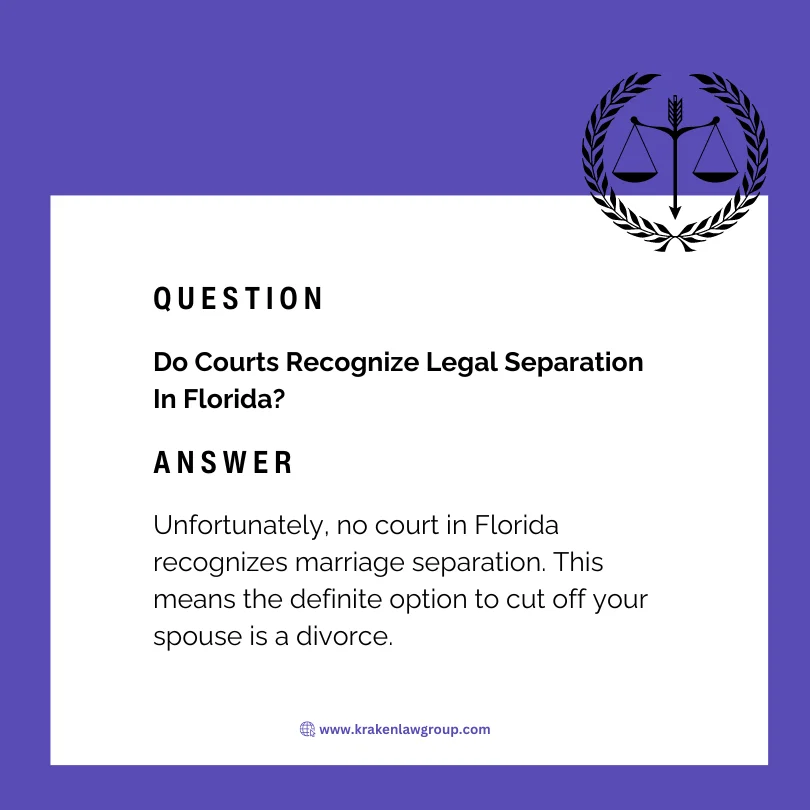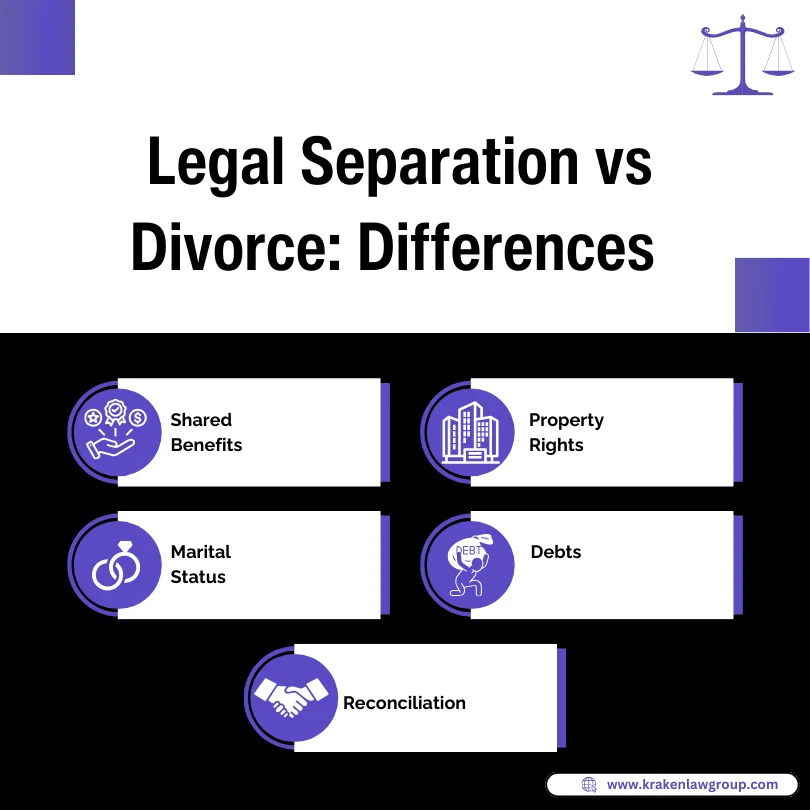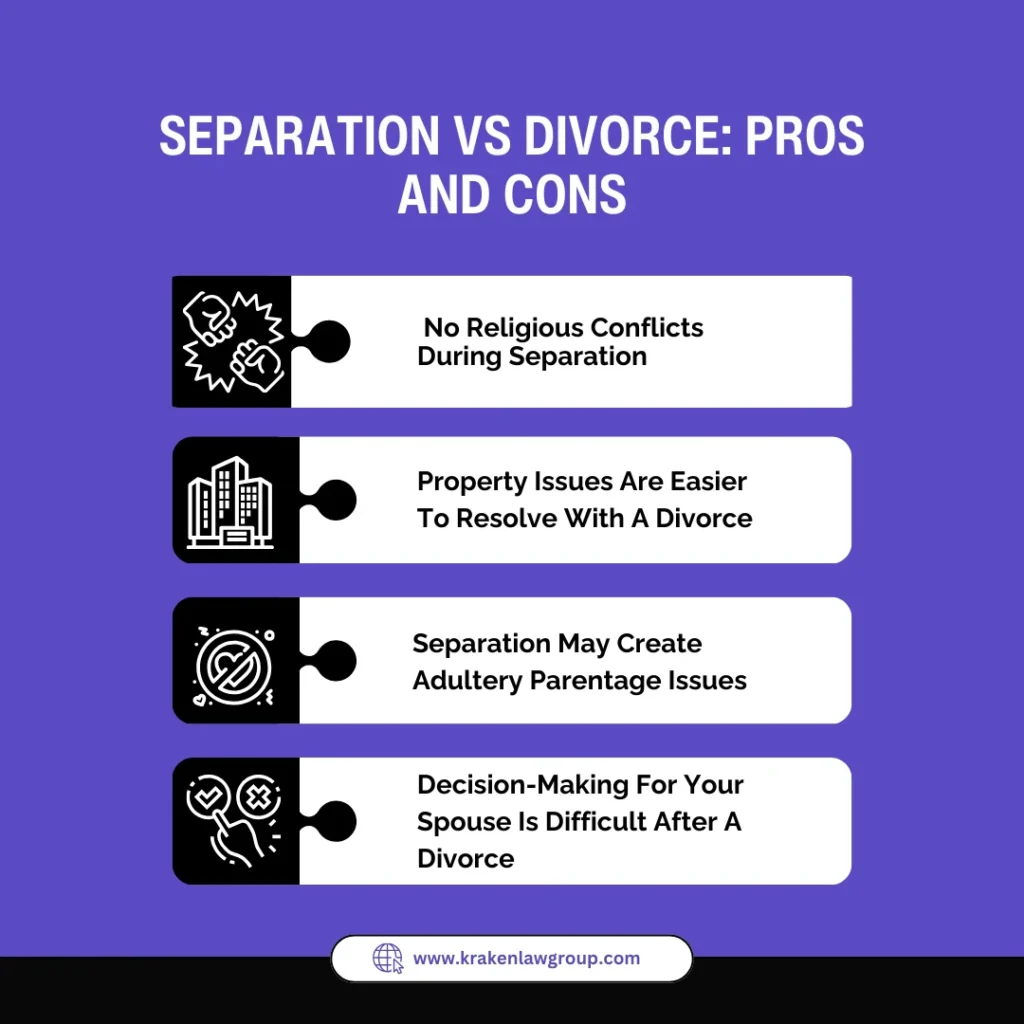The marriage rate in Florida increased from 5.7 to 6.8 per 1,000 residents from 2020 to 2021. However, not all couples end up enjoying a long-lasting marriage.
Many people ponder over legal separation vs divorce when they can’t work out their marriage problems. If you want to learn more about this, you’re in the right place.
Let’s dive into the world of legal separation vs divorce in Florida.
Do Courts Recognize Legal Separation In Florida?

You may think a lot about legal separation vs divorce in Florida and may choose the former option. However, it is important to know whether courts recognize it or not.
Unfortunately, no court in Florida recognizes marriage separation. This means the definite option to cut off your spouse is a divorce.
You may have to hire a lawyer to understand legal separation vs divorce laws in Florida better.
Legal Separation Vs Divorce: What Are The Differences?

People wonder about legal separation vs divorce mainly due to their differences. Here are the top five of them to enhance your grasp on these things:
1. Benefits
One of the main differences between marriage separation and divorce is shared benefits. Every couple benefits from shared insurance, savings accounts, mortgage loans, and other benefits.
There is also a difference between military and social security benefits when couples are separated vs divorced. For example, you and your spouse will not be eligible for joint benefits after a divorce.
You and your spouse will have to get separate health insurance plans after a divorce. Saving accounts must also be separated after the proceedings.
Other details of these benefits include:
- Spousal healthcare benefits are no longer applicable after a divorce
- Military benefits increase after 10 years of marriage and separation time does not affect it
- Couples can file joint taxes even after separation
However, couples don’t have to change most of these things if they pursue legal separation. That is because both parties will still be married on paper under this category.
2. Property Rights
When a couple is together, they have different assets under marital and non-marital categories. The former properties belong to both spouses equally and allow them to make contributions to it.
However, laws around property rights differ when you consider legal separation vs divorce. For example, marriage separation allows a spouse to retain their rights to spousal properties.
Even if your spouse passes away during legal separation, you will still have a right to their property. However, divorce changes the rights to different assets.
You will not have any access to your spouse’s properties after your marriage ends in divorce.
3. Marital Status
A key difference between legal separation vs divorce is the marital status of the couple. You and your spouse will still be married on paper after legal separation. This means the outside world will still perceive you as a couple.
When getting insurance plans, this allows you to avail spousal benefits feature. You must also check the “married” box when filling out forms if you and your spouse are experiencing marriage separation.
A divorce will change your marital status to single completely. This means every place that offers spousal benefits will not be for you.
When filling out forms at hospitals or other places, you must check the “single” box under the biodata section.
4. Debts
Many couples get into debt during their marriage for different things. These come under the marital debt category. You and your spouse will be responsible for managing the payments together.
This means the debt will be a joint one. Of course, only you may be paying it off as the primary breadwinner of the family. Whatever the case, you and your spouse will have complete control over debt management.
Once you have gotten legal separation, new debt may or may not be under the joint category. This will vary according to the laws of every state.
However, divorce significantly changes the control of spouses over joint debts. That is because a court judge will divide the marital loans between the spouses equally or equitably.
The exact division will depend on various factors such as:
- Net income of the two spouses
- Contributions towards the marriage
- How much debt has been cleared so far?
Remember courts don’t divide non-marital debts of the spouses. You will solely be responsible for paying off any loan you got before the marriage.
5. Reconciliation
Some couples make decisions about divorce hastily after getting into minor fights. Many people also regret their decision after the finalization of their divorce is done.
This means that a divorce eliminates the possibility of reconciliation because it is final. However, legal separation does not do that. You and your spouse will be living separately while being married.
So you can take the time apart to think more about your marriage and see whether it is reparable. You and your spouse may even fall in love again with each other while being separated.
The good news is if you and your spouse reconcile during your marriage separation, there will be no major changes. However, if you decide to reconcile with your spouse after a divorce, there will be significant changes.
For example, you will have to reunite with your spouse by marrying in a church or court again. You will also have to apply again for all benefits that you lost after the divorce.
Separation Vs Divorce: Pros And Cons

Before filing for separation vs divorce, you must understand their pros and cons. A comprehensive comparison will allow you to make a wise decision about legal separation vs divorce:
1. No Religious Conflicts During Separation
One of the top pros of legal separation over divorce is that you will not encounter any religious conflicts. Many religions don’t allow couples to get divorced. That is why you may suffer from conflicts when facing marital difficulties.
For example, some branches of Judaism don’t allow couples to get divorced. Even in Christianity, couples should not file for divorce after getting married.
Some people following these religions have strict beliefs about being separated vs divorced. For instance, some people don’t believe in continuing their marriage if it’s causing harm to their mental health.
These people directly file for divorce in court. However, those with strong religious beliefs consider legal separation in their state.
Legal separation allows you to stay married in legal courts. You and your partner will only be apart from each other physically. Your marriage will still be valid in a church and court.
So this separation method allows you to be done with your marriage without breaking any religious rules. It will also save you from hurting your family especially if they have strict beliefs about divorce.
In some families, regardless of religion divorce is not an option to keep up societal appearances.
2. Property Issues Are Easier To Resolve With A Divorce
Various types of property issues can arise when couples opt for legal separation instead of a divorce. For example, you may not have divided your properties especially marital assets on paper.
However, there may have been a verbal agreement between you and your spouse about access to different properties. For example, your spouse may have gotten the marital home after separation.
If the division is not final on paper, it may create liability issues when people get hurt on the property. For example, a guest may trip on a faulty stair of your marital home. They may decide to file a case against the property owner for compensation.
You and your partner may be legally separated, but the property may still be in your names jointly. If that is the case, you will also have to contribute towards the compensation. This is why property rights are complex after legal separation.
However, divorce makes things easier because all assets undergo legal division. The ownership of the properties will also be clear to ensure couples don’t face issues later.
Liability for issues on your property will also be clear after a divorce due to appropriate division. The best thing is that you will not have to worry about resolving issues that occur on your partner’s property or assets.
3. Separation May Create Adultery Parentage Issues
It is important to think about all legal separation vs divorce pros and cons before opting for a single option. That is because you may experience different issues in both cases. So you’ll have to decide which issues are less severe and easier to handle.
For example, legal separation can lead you to be charged with bigamy by prosecutors. This is especially true if you and your spouse live separately in a state that does not recognize separation such as Florida.
If you start dating someone else, while being married on paper, you can face adultery charges by your spouse. Some partners may agree to legal separation, but they may regret their decision later. They may decide to hurt you or ensure your marriage continues by pressing adultery claims.
Another issue that separation creates includes parentage problems. If your wife gets pregnant during this time, you may still be the presumptive father of the child. That is because your marriage will be valid on paper.
This means you’ll have to support the child and give them your name. Of course, you may not want to do that. If so, the only option you’ll have is to divorce your spouse.
4. Decision-Making For Your Spouse Is Difficult After A Divorce
Legal separation vs divorce pros and cons include decision-making factors. Making medical decisions for your spouse will be easier if you’re married on paper. That is because you’ll still have a right to be the next of kin of your partner.
If you experience a divorce, you’ll no longer be the next of kin for your spouse. This means you cannot make any medical decisions for your partner if they get into accidents. You’ll also lose primary visitation rights in a hospital because they will not consider you as family.
This is why many people choose legal separation over divorce especially if they have no other family or reliable friends besides their partner. Your spouse may trust you to make decisions regarding their health wisely.
You’ll also have the right to make other decisions on their behalf. For example, they may be put in jail due to false allegations. As their spouse on paper, you can hire a lawyer for your partner and defend them.
Can You Separate Without Legal Recognition?
You may separate from your spouse without legal recognition by forming a verbal agreement with them. However, that will prevent you from dividing your assets as people do in legal separation.
It will also not be possible to separate your finances if your separation doesn’t have legal recognition. So while you can separate using verbal agreements without court recognition, it is not a preferable option.
FAQs
Can A Spouse Refuse Divorce In Florida?
A spouse can refuse to divorce in Florida, but that will not stop you from filing for a divorce. Florida is a no-fault divorce state, so if you meet the ground rules of this process, you can still file for it.
Can You Date While Separated In Florida?
There is no law that prevents you from dating someone when separated in Florida. Of course, it is better to wait until your divorce is finalized before starting dating. This will save you from facing adultery charges.
How Much Alimony Is Required In Florida Divorce?
Alimony amount in Florida depends on the requestor’s need and the other spouse’s ability to pay. Typically, it is not more than 40% of the net income of the paying party.
What Is The 7-Year Divorce Rule In Florida?
The 7-year divorce rule states that a marriage is moderate-term if the couple has been married for seven years. This duration may affect equal asset division significantly.
Final Thoughts
Now that you know everything about legal separation vs divorce in Florida, you may want to consult with a lawyer. If so, you don’t have to look far.
Contact us today to learn more about alternatives to legal separation or starting your divorce proceedings.


